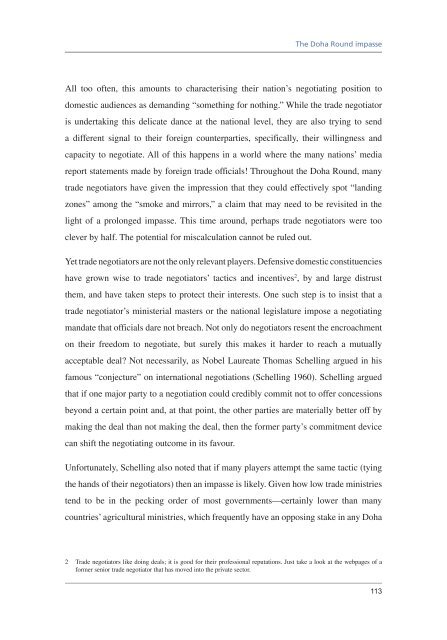Download PDF - Vox
Download PDF - Vox
Download PDF - Vox
- No tags were found...
Create successful ePaper yourself
Turn your PDF publications into a flip-book with our unique Google optimized e-Paper software.
The Doha Round impasseAll too often, this amounts to characterising their nation’s negotiating position todomestic audiences as demanding “something for nothing.” While the trade negotiatoris undertaking this delicate dance at the national level, they are also trying to senda different signal to their foreign counterparties, specifically, their willingness andcapacity to negotiate. All of this happens in a world where the many nations’ mediareport statements made by foreign trade officials! Throughout the Doha Round, manytrade negotiators have given the impression that they could effectively spot “landingzones” among the “smoke and mirrors,” a claim that may need to be revisited in thelight of a prolonged impasse. This time around, perhaps trade negotiators were tooclever by half. The potential for miscalculation cannot be ruled out.Yet trade negotiators are not the only relevant players. Defensive domestic constituencieshave grown wise to trade negotiators’ tactics and incentives 2 , by and large distrustthem, and have taken steps to protect their interests. One such step is to insist that atrade negotiator’s ministerial masters or the national legislature impose a negotiatingmandate that officials dare not breach. Not only do negotiators resent the encroachmenton their freedom to negotiate, but surely this makes it harder to reach a mutuallyacceptable deal? Not necessarily, as Nobel Laureate Thomas Schelling argued in hisfamous “conjecture” on international negotiations (Schelling 1960). Schelling arguedthat if one major party to a negotiation could credibly commit not to offer concessionsbeyond a certain point and, at that point, the other parties are materially better off bymaking the deal than not making the deal, then the former party’s commitment devicecan shift the negotiating outcome in its favour.Unfortunately, Schelling also noted that if many players attempt the same tactic (tyingthe hands of their negotiators) then an impasse is likely. Given how low trade ministriestend to be in the pecking order of most governments—certainly lower than manycountries’ agricultural ministries, which frequently have an opposing stake in any Doha2 Trade negotiators like doing deals; it is good for their professional reputations. Just take a look at the webpages of aformer senior trade negotiator that has moved into the private sector.113














